Five essential steps to creating a formal scientist resume
The road to becoming a formal scientist is long and arduous, paved with the hard work of many years spent in academic labs and research facilities. Once you are ready to embark on your own as a formal scientist, it is essential to create a resume that captures your many talents in the field.
In this guide, we will take you through 5 key steps to writing a resume as a formal scientist. Keep reading to learn how to:
- Opt for a curriculum vitae over a standard resume
- Write a resume summary that reflects your scientific talents
- Include both technical and interpersonal skills on your resume
- Highlight your key scientific accomplishments in work experience
- Properly list your education as a formal scientist
Still looking for a job? These 100+ resources will tell you everything you need to get hired fast.
1. Opt for a curriculum vitae over a standard resume
When applying to jobs within academic or scientific fields, you likely will not use a standard resume format. Instead, you will want to use a longer-form resume known as a Curriculum Vitae, or CV.
The Curriculum Vitae is a multi-page document that explores a job applicant’s entire academic and professional career. Rather than summarizing only the most important information, a CV will provide a much more immense amount of detail.
Along with the standard skills, work experience, and education sections, a CV can also include:
- Certifications
- Publications and Presentations
- Professional Associations
- Awards and Accolades
- Training Events and Conferences
- Languages
Choose your preferred template and make your resume shine.
2. Write a resume summary that reflects your scientific talents
A resume summary is a short introductory statement that – when well-written – can hook the attention of employers and give your resume or CV the competitive edge it needs.
As you write your resume summary, it is important to consider what key information you want to include. You should always strive to include the most impressive details about your career thus far, such as listing major accomplishments or awards when possible.
With this in mind, let’s look at a weak version of a resume summary, followed by a corrected example and explanation.
Incorrect scientist professional summary example
Formal Scientist with many years of experience working in biological research. Specialized in performing DNA extractions on bacteria. Highly knowledgeable of and skilled in working with digital laboratory information management systems.
Why is this Incorrect?
There are some strong details in this summary, such as the applicant’s specialization in DNA extractions and their knowledge of digital information management systems. However, this summary would be a lot more effective with more specific information regarding how the applicant applies their specialized skills and knowledge.
Corrected scientist professional summary example
Biology Research Scientist with 7+ years of experience working in experimental laboratories. Specialized in performing DNA extraction on bacteria for the purpose of disease research and prevention. Highly knowledgeable of digital laboratory information management system, helping previous employer to install a new system that decreased time to complete lab reports by 25%.
Why is this Correct?
In this corrected example, the applicant offers up a lot more information regarding the specifics of their specialized skills and knowledge. Along with better explaining their years of experience and concentration in working with bacteria, they also detail the key accomplishment of installing a new information management system at a previous job.
3. Include both technical and interpersonal skills on your resume
Working as a formal scientist requires you to apply both your technical and interpersonal skills daily.
Technical skills refer to the abilities you gained through training and education, while interpersonal skills deal with how you interact and communicate with other people. Including both on your resume demonstrates to employers that you understand the value of people skills as a crucial support to your scientific expertise and endeavors.
To help you brainstorm skill ideas for your resume, here are 10 examples of both technical and interpersonal skills that look great on a formal scientist’s resume:
The best scientist technical skills to put on your CV
- Conducting scientific experiments
- Developing hypotheses
- Creating new formulations
- Ehancing existing formulas
- Writing research reports
- Performing fieldwork (collecting samples, studying animal patterns, etc.)
- Presenting scientific findings
- Supervising lab or field staff
- Analyzing data
- Demonstrating scientific procedures
Effective interpersonal skills for your scientist resume
- Attention to detail
- Verbal communication
- Leadership
- Collaboration
- Critical thinking
- Multi-tasking
- Adaptability
- Intellectual curiosity
- Creativity
- Problem-solving
4. Highlight your key scientific accomplishments in work experience
When describing your scientific work experience on a resume or CV, it is important to focus on your most important responsibilities and accomplishments.
By doing so, you will demonstrate to employers that you not only have a wide range of skills but also know how to apply those skills in lab, research, and fieldwork settings.
Here is an example of a work experience entry from a formal scientist resume
Botany Explorations, Inc., Richmond, VA
Formal Scientist
January 2015 to March 2021
- Collected 200+ plant samples a week from both wild-grown organisms and greenhouse-grown organisms.
- Tested over 50 different fertilization solutions, identifying 3 solutions that maximize crop yield with minimal environmental impact.
- Submitted more than 70 research papers to be peer-reviewed, 45 of which made it to formal publication in scientific journals.
5. Properly list your education as a formal scientist
Applying for a job as a formal scientist means there is a good chance you will use a CV-style resume. In this case, your education section will be longer than that of a standard resume format and will include extra information, like key accomplishments and publications.
Rather than being a small section, the education section of your CV will have many detailed entries, similar to the work experience section.
As you write your educational credentials, make sure to include accurate information such as degree titles, university names, and graduation dates.
Here is an example of a well-crafted education section entry on a formal scientist resume
Education
Arizona State University, Tempe, Arizona
Ph.D. in Geological Sciences
- Graduated: 2017
- Dissertation: Coastal Erosion, Tectonic Plates, and the Future of the United States West Coast
Peer-Reviewed Publications
- Food Desserts: An Examination of the Intersection of Geology and Food Scarcity - Published in the American Association for the Advancement of Science’s Science Journal, 2019
- Environmental Risks in Portland’s Expanding Coastal City - Published in the Journal of Environmental Conservation and Risk Reduction, 2018

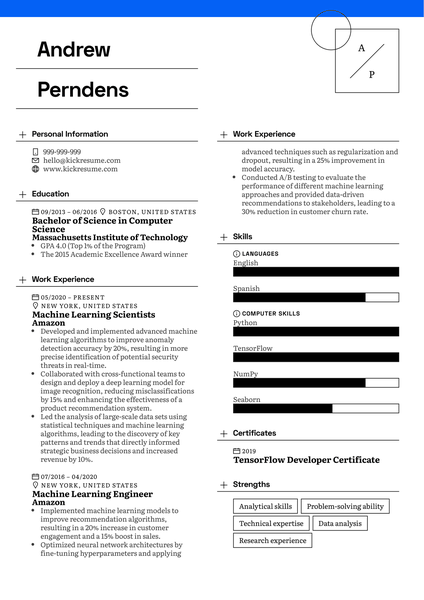
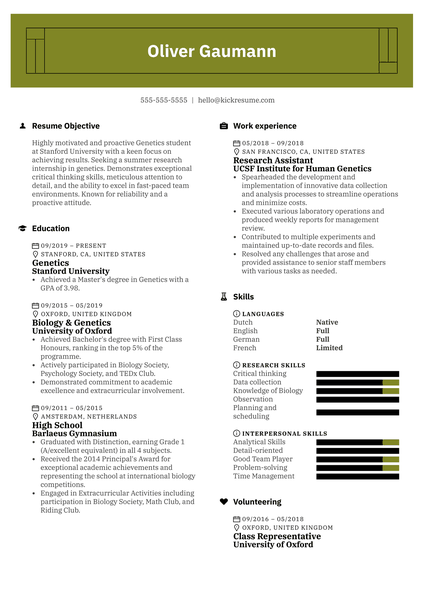
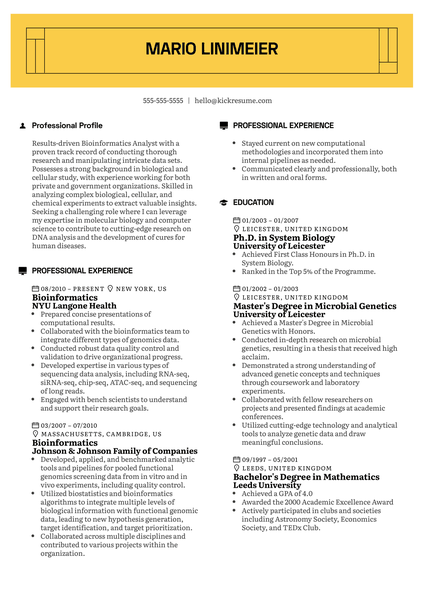
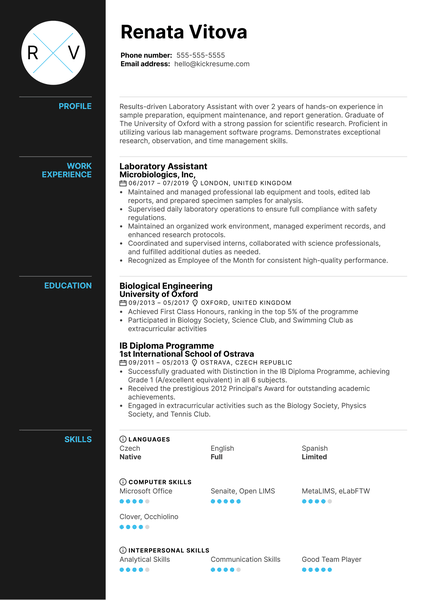




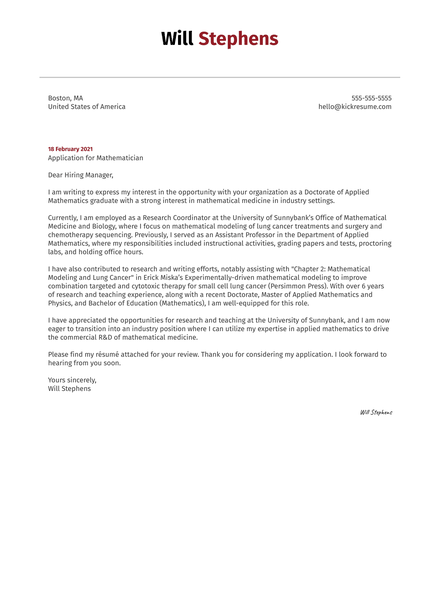
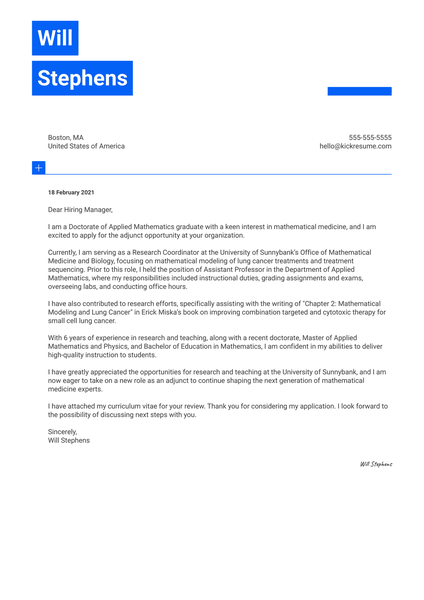

![How to Write a Professional Resume Summary? [+Examples]](https://d2xe0iugdha6pz.cloudfront.net/article-small-images/i-Profile.svg)
![How to Put Your Education on a Resume? [+Examples]](https://d2xe0iugdha6pz.cloudfront.net/article-small-images/i-Collage-Universities.svg)
![How to Describe Your Work Experience on a Resume? [+Examples]](https://d2xe0iugdha6pz.cloudfront.net/article-small-images/Experience.svg)


